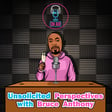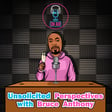
The People’s Voice: Dr. Marjan Ehsassi on Citizen Assemblies & Change
In this episode of Unsolicited Perspectives, host Bruce Anthony sits down with Dr. Marjan Ehsassi, a leading expert in democratic innovations and author of Activated Citizenship: The Transformative Power of Citizen Assemblies. Together, they dive into Dr. Ehsassi’s work in international affairs and her commitment to strengthening democracy by engaging everyday citizens in the policymaking process. The conversation unfolds around the structure and potential of citizen assemblies, highlighting their role in fostering genuine civic duty, tackling political polarization, and enabling communities to address shared issues through meaningful deliberation.
Dr. Ehsassi explains how citizen assemblies offer a fresh approach to policy creation by involving a diverse cross-section of society and shares the compelling benefits these gatherings bring, such as increased political engagement and a stronger sense of community. Bruce and Dr. Ehsassi also explore the broader challenges of modern democratic governance, discussing the impact of social media and technology on public discourse, and consider ways we might ensure a truly representative democracy in the future.
This episode of Unsolicited Perspectives concludes on a hopeful note, encouraging listeners to embrace active citizen participation as a critical component of a thriving democracy. #CitizenAssemblies #DemocraticEngagement #ActivatedCitizenship #democracy #unsolicitedperspectives
🔔 Hit that subscribe and notification button for weekly content that bridges the past to the future with passion and perspective. Thumbs up if we’re hitting the right notes! Let’s get the conversation rolling—drop a comment and let’s chat about today’s topics.
For the real deal, uncensored and all, swing by our Patreon at patreon.com/unsolicitedperspectives for exclusive episodes and more.
Thank you for tuning into Unsolicited Perspectives with Bruce Anthony. Let's continue the conversation in the comments and remember, stay engaged, stay informed, and always keep an open mind. See you in the next episode!
Chapters:
00:00 Welcome to Unsolicited Perspectives
00:33 Introducing Dr. Marjan Horst Ehsassi
02:14 Dr. Ehsassi's Background and Inspiration
04:51 Understanding Citizens Assemblies
08:52 Challenges and Solutions in Citizens Assemblies
12:13 Citizens Assemblies in Different Countries
16:11 Impact and Future of Citizens Assemblies
25:34 Increasing Citizen Involvement in Democracy
30:57 Strategies to Strengthen Democracy
34:08 The Role of News and Local Issues
38:27 Future of Democratic Governance
41:28 Defining an Engaged Citizen
44:12 Reaching the Apathetic and Skeptical
47:39 Final Thoughts and Hope for Democracy
50:54 Closing Remarks and Call to Action
Follow the Audio Podcast:
Apple Podcast: https://podcasts.apple.com/us/podcast/unsolicited-perspectives/id1653664166?mt=2&ls=1
Spotify: https://open.spotify.com/show/32BCYx7YltZYsW9gTe9dtd
www.unsolictedperspectives.com
Beat Provided By https://freebeats.io
Produced By White Hot

